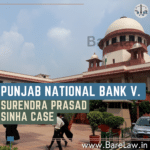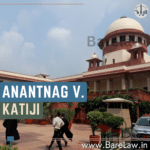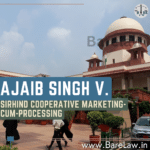
Table of Contents
The Supreme Court of India’s judgment in Supreme General Films Exchange Ltd v. Maharaja Sir Brijnath Singhji Deo, AIR 1975 SC 1810 | BareLaw
India’s Supreme Court ruling in the case of Supreme General Films Exchange Ltd v. Maharaja Sir Brijnath Singhji Deo, AIR 1975 SC 1810, is a fascinating excursion into property law and operation of the Specific Relief Act (SRA) 1877. This case throws up legal arguments involved in lease agreements as well as declaratory reliefs.
Background and Parties InvolvedIn this matter, Supreme General Films Exchange Ltd was appellant whereas Maharaja Sir Brijnath Singhji Deo was one of the respondents. It concerned a dispute over lease of a cinema theatre. Appellant claimed to be lessee while plaintiff-respondent’s mortgagee was the theatre. At issue also was a compromise decree entered into in 1960 providing for sale of the theatre upon payment of outstanding amounts.
Legal DisputeThe appellant remained as a tenant holding over from an original lease executed in 1940 which expired in 1946 until another lease deed was executed in 1956 aimed at carrying out the terms contained in the compromise decree arrived at on terms agreed between them in 1960. However, the leasehold interests created by that lease were said to be void because they were inconsistent with sections of both Transfer of Property Act and Code of Civil Procedure. On its part, the defendant maintained that its suit fell outside Section42 SRA since it only sought declaration.
Central Issue The main question for determination here is whether declaratory relief can be granted outside Section42 SRA as interpreted by Indian Courts since it does not provide for such remedy.
Judgment and Analysis the Supreme Court explains under what circumstances declaratory decree could be passed under section-42 or otherwise stating that; there must be some legal interest on persons’ part claiming any right or title before coming forward with such prayers. Therefore, being an assignee of right due to attachment made against judgment debtor who was the property-owner, apart from his function as a mortgagee, the plaintiff has sufficient legal interest to maintain suit for declaratory reliefs. This judgement throws light on section 42 and thus highlights the need for substantive legal interests in property disputes.
Conclusionn this case, the Supreme Court of India demonstrates how Specific Relief Act of 1877 and property law interrelate in it is administration. It also underlines significance of comprehending legal implications surrounding leases as well as what circumstances will make it possible to apply for declaratory reliefs. The ruling is an influential precedent in Indian property law, notably in relation with complicated lease arrangements and rights of mortgagees.
Summary:
The following article delves into a detailed analysis of the Supreme Court case Supreme General Films Exchange Ltd v. Maharaja Sir Brijnath Singhji Deo; this focuses on some legal issues that arise out of lease agreements as well as mortgagee’s rights which are to be treated within SRA 1877. The significance of the judgment vis-à-vis Indian Property Law is also discussed through this paper.





